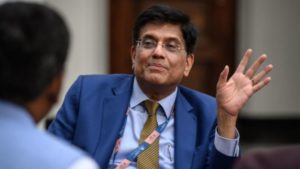War against Covid-19 has to embrace all the three critical dimensions: testing, tracking, and treatment

At the recent 12th Ministerial Conference (MC12) at the World Trade Organisation (WTO) headquarters in Geneva (June 12-17), it was advantage developed countries – the US, the European Union, the UK, Australia etc., — all the way. The Indian delegation led by Commerce Minister Piyush Goyal occupied the centre-stage steering negotiations in all key areas but the outcome was not in their favour.
First, India went to MC12 demanding a Trade-Related Aspects of Intellectual Property Rights (TRIPS) Waiver for all Covid-related therapeutics and diagnostics, besides vaccines. Against this, the MC-12 granted a patent waiver (albeit ‘temporary’ and ‘limited’) only for Covid-19 vaccines which will allow India to authorise production of patented vaccines without taking consent of the patent holder for domestic requirements and exports.
War against Covid-19 has to embrace all the three critical dimensions: testing, tracking, and treatment. Apart from the vaccine, diagnostics and therapeutics too need to be available at affordable rates. In this regard, to say “a decision on these would be taken in six months” is to the benefit of none.
As for the vaccines patent waiver, putting a time limit of five years is too restrictive considering that Covid-19 is here to stay and a host of new variants are popping up every so often; even the World Health Organisation (WHO) has cautioned that the pandemic may recur every six months.
Second, India wanted a permanent solution to the public stockholding (PSH) program for food security. Under this program, government agencies like Food Corporation of India (FCI) buy agri-produce such as wheat, rice/paddy, and coarse cereals from farmers at the minimum support price (MSP) and distribute it at a heavily subsidised price — of Rs 1/2/3 per kg — to meet the needs of India’s poor and vulnerable.
The price in excess of MSP and costs incurred for handling, storage and distribution, over the realisation from sale, is paid as subsidy from the Union Budget.
This includes subsidy to the farmer, being the excess of MSP of rice, for example, over its price during 1986-88, also known as External Reference Price (ERP). Under the Agreement on Agriculture (AoA) of the WTO, this excess, which is termed product-specific subsidy, is capped at 10 per cent of the crop value for a developing country. If a member country gives in excess of 10 per cent, it is a violation.
At present, India enjoys protection under a “peace clause”, which was sanctioned in the MC9 held in Bali (2013). It said: “If a developing country gives AMS in excess of 10 per cent, no member will challenge this until 2017, when the WTO would look for a permanent solution.” In the General Council (GC) held in December 2014, this sanction was modified to say “the peace clause will stay till a permanent solution is found.”
However, the peace clause comes with several riders, such as submission of data on food procurement, stockholding, distribution and subsidies. These also include establishing that subsidies are not “trade distorting.” This makes India vulnerable.
Against this backdrop, India asked for “total exemption for support to PSH for food security.” Alternatively, it sought removal of flaws in subsidy calculation, most serious being ‘taking ERP for the year 1986-88’ (instead of the ‘relevant year) which “artificially” inflate the subsidy beyond the 10 percent threshold. Unfortunately, the issue was not even put on the table (it has been deferred to the next ministerial).
Third, on fisheries subsidies, in sync with the principles of “polluter pays” and “common but differentiated responsibilities,” India had proposed that developed countries abolish their subsidies over the next 25 years even while exempting developing countries from over-fishing subsidy prohibition within these 25 years.
The MC12 decided that “no subsidies will be given for fishing in areas outside exclusive economic zones (EEZ) or RFMOs (regional fisheries management organisation)”. It also agreed to check illegal, unreported and unregulated (IUU) fishing and mooted “very strict controls” on overfishing so that fish stocks are restored.
These decisions don’t impact us, as the curbs are only on subsidies for IUU fishing and fishing outside EEZ or RFMOs, and India does not indulge in any such activities.
India can give subsidies for fishing in the EEZ – merely a reiteration of its rights under UN Law of the Sea Convention. But, this is subject to putting in place a regime for managing and monitoring marine fish stocks within two years. If, it fails, it will be compelled to stop subsidies for poor fishermen.
Fourth, India wanted the moratorium on customs duty on e-commerce (developed countries have been its prime beneficiaries since 1998) to go as developing countries are losing billions of dollars in duties foregone.
Yet, it was decided to extend the moratorium till MC13 or March 2024, whichever is earlier.
To conclude, in sync with the decisions taken in the past, at MC12 ,too, developed countries set the agenda and ensured that the developing countries concurred with what they wanted.
(The writer is a policy analyst)
https://www.deccanherald.com/opinion/in-perspective/mc12-advantage-developed-countries-1124127.html